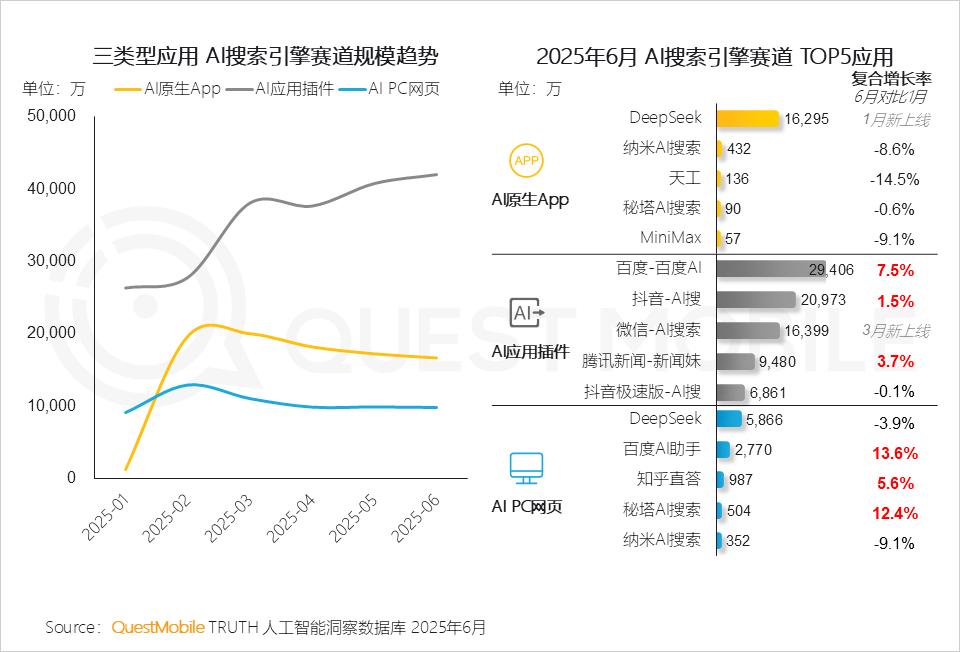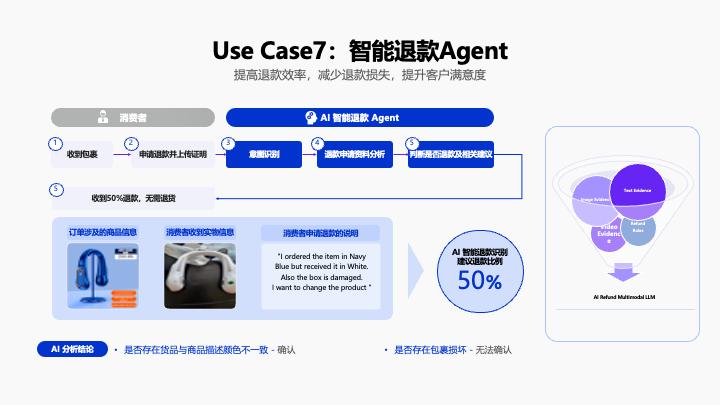Big Tech's "AI" Agents Await the DeepSeek Moment
![]() 07/31 2025
07/31 2025
![]() 465
465

DeepSeek has accelerated the adoption of Agents, yet another push is required for in-depth scenario application.
Written by | Lan Dong Business, Zhao Weiwei
The 2025 World Artificial Intelligence Conference (WAIC) has concluded, but the anticipated "big reveal" in AI did not materialize.
Despite high enthusiasm and a surge in attendance, WAIC this year attracted over 2.36 billion views across the internet, a 21.6% increase from last year. However, the suspense remains: OpenAI's upcoming GPT-5 and DeepSeek's long-awaited new model V4 or R2, rumored to be released in early August, were absent from WAIC with no news of their appearance.
The AI landscape remains largely unchanged, with internet giants such as Douyin, Tencent, Alibaba, and Baidu occupying a strong position. They form the first tier with deduplicated user scales reaching 1.266 billion, 1.248 billion, 1.168 billion, and 1.105 billion, respectively.
According to the "2025 China Mobile Internet Semi-Annual Report," among the three application types of AI app markets—native apps, AI application plugins, and AI PC webpages—80% of the top 30 applications come from internet enterprises. The four major groups occupy a strong position, accounting for 66.7% of the share. In terms of native app growth, DeepSeek, Doubao, and Tencent Yuanbao occupy the top three spots.

More striking in terms of track size data is AI plugins, as native apps are increasingly being diverted by traditional apps through access to DeepSeek. Therefore, from a data perspective, the growth trend of AI plugins' scale is higher than that of AI native apps and AI PC webpages. In terms of the scale of AI application plugins, Baidu AI, Douyin AI Search, and WeChat AI Search occupy the top three positions, respectively.
The stable traffic pattern remains unchanged, and one of the AI priorities for the four giants this year is to accelerate the implementation of B-end Agents (intelligent agents) in specific scenarios.
"Artificial intelligence has entered the second half with agent applications as the core," an industry analyst pointed out to "Lan Dong Business." On one hand, internet giants are enhancing their large model capabilities and improving the underlying capabilities of Agents; on the other hand, they must demonstrate Agents' implementation in specific scenarios across various industries. Both general capabilities and scenario-focused efforts are indispensable.
An Agent is literally translated as an agent and essentially an application system that uses AI capabilities to help humans plan and execute tasks. Compared to the more common generative dialogue applications today, Agents' strength lies in solving complex, multi-step problems. It's not humans adapting to AI, but AI actively serving humans.
Alibaba and Tencent Offer a Full Suite
Tencent adopted a comprehensive strategy at WAIC, unveiling over 10 Agents across vertical fields, including a health management Agent, an enterprise marketing cloud Agent focusing on marketing, a Tencent Maps travel planning Agent for travel itinerary scenarios, and a CodeBuddy Agent to help developers with code diagnosis and review, covering enterprise services, lifestyle, and office scenarios.
This comprehensive full-suite strategy remains to be tested by time. Take the Tencent Maps travel planning Agent as an example, which is essentially a competitor to Gaode Maps. In April this year, Gaode launched the industry's first map-based AI navigation Agent (NaviAgent), capable of thinking and anticipating, such as real-time perception of surrounding vehicle dynamics during driving and issuing lane-level safety warnings.
On the Agent development platform, Tencent recently showcased Tairos, an embodied intelligence open platform for the robotics industry, in addition to the previously announced Tencent Yuanqi for the To C direction and the Tencent Cloud Agent development platform for the To B direction. Tencent's intention to focus on specific AI scenarios is becoming more apparent. Tairos, an embodied intelligence open platform, is a pioneering effort by Tencent and aligns with the current trend of embodied intelligent robots.
Essentially, Tairos aims to equip robots with brains. While robotics companies focus on the robot's physical aspects, Tencent sells models and computing power to them rather than directly entering the robotics market.
In terms of embodied intelligence, Tencent released a multi-modal perception model, a planning large model, and a joint perception-action large model. According to Tencent's vision, Tairos enables robots to possess capabilities such as perceiving the world, planning tasks, and making autonomous decisions, evolving from passive, instruction-executing mechanisms to intelligent beings that actively adapt to the real world.
Embodied intelligent robots are still in an early market stage, and whether Tencent's embodied intelligence open platform can successfully equip robots with "brains" remains to be tested by execution capabilities.
Just as Huawei and Baidu's ventures into car manufacturing, Baidu once hoped to provide automakers with autonomous driving technology solutions through its Apollo business, but facts have proven that without hardware manufacturing capabilities, it is difficult to achieve commercial success without personally defining products.
Compared to Tencent, Alibaba performed better at this year's WAIC. At the very least, the new product architecture of the Alibaba Cloud Bailian Application Development Platform became one of the highlights of the event. The reason for Alibaba Cloud Bailian's success is that over 200,000 developers have created over 700,000 Agent applications.
Quantity does not necessarily equate to strength, and what is remarkable is the validation through practical implementation. Alibaba Cloud serves as a mirror reflecting the implementation of Agents by Chinese enterprises.
Alibaba Cloud recently published an article titled "3 Months, 200 Customers, Let's Talk About the Practical Implementation of Enterprise AI Applications (AI Agents)," discussing the implementation of enterprise-level AI applications from four core elements: Agents, large language models, MCP services, and AI observation systems.
According to Alibaba Cloud's research, when enterprises build AI applications, the vast majority choose the path of transforming existing businesses rather than developing entirely new products. Essentially, transforming existing businesses involves "changing the business entry point from requesting traditional services to requesting AI Agents."
Currently, the market has various applications for Agents. Regarding the practical implementation of AI Agents, Alibaba Cloud categorizes different customers and business scenarios into three types: AI Agents assisting foundational large language models, which are primarily companies building foundational models, including Tongyi Qianwen Qwen3 and Zhipu GLM; general AI Agents based on the mainstream Chat mode, including OpenManus, JManus, MiniMax Agent, Kunlun Wanwei, etc.; and AI Agents assisting existing businesses, which are currently expected to be built by a vast number of internet and pan-enterprise customers. Alibaba Cloud's practical implementation targets include Zhihu, Yunmanman, and Yiwu Small Commodities, among others.
In other words, companies of different business types are creating AI Agents tailored to their business scenarios, and low-code construction of auxiliary AI capabilities has become the mainstream choice for internet companies.

Within Alibaba's own ecosystem, Agent implementation has also begun. For example, Alibaba International's Smart Refund Agent can quickly and flexibly meet users' refund demands, significantly reducing merchants' after-sales costs. Alibaba International announced data showing a 30% reduction in dispute resolution time and a 15% decrease in refund costs.
In fact, the massive Alibaba has more than one Agent in this direction recently. Lingyang, a wholly-owned subsidiary of Alibaba, is also testing a Customer Agent application. Its officials claim that after deploying the return and exchange Agent, the average processing time for refunds has been shortened by over 60%, and the overall manual processing efficiency has increased by over 60%.
Although their promotional messaging differs, both are of the same type, underscoring the importance of return and exchange Agents. Essentially, they belong to intelligent customer service and address real, detailed issues in business. This To B implementation scenario is a typical scenario for Agent implementation and a more pragmatic mainstream direction.
Baidu Creates Humans, ByteDance Opens Source
As always, ByteDance did not participate in this year's WAIC, but that does not mean it is absent from AI Agent implementation.
Recently, the core capabilities of the Volcano Engine AI Agent development platform, Kouzi, were officially open-sourced, including two core projects: Kouzi Development Platform (Coze Studio) and Kouzi Compass (Coze Loop), which users can directly download on GitHub. This move caused quite a stir among AI developers and is considered beneficial for global developers to jointly build an Agent ecosystem.
Simply put, one of these products focuses on Agent development, while the other focuses on Agent iteration. "The open-source licenses for both projects are Apache 2.0, meaning you can use them commercially without authorization and can conduct secondary development as needed, making them suitable for personal or corporate use. You can easily set up a suite for use in your own environment," an AI developer believes.
According to data released by Volcano Engine, within just three days of open sourcing, Coze Studio surpassed 10,000 stars on GitHub, and Coze Loop had over 3,000 stars.
Not participating in major AI events but sparing no effort to host its own smaller events is a more pragmatic choice for Volcano Engine.
At the recent FORCE Link AI Innovation Tour in Xiamen, Volcano Engine unveiled three AI advancements, including the SeedEdit 3.0 image editing model with enhanced instruction compliance capabilities, the Seed-LiveInterpret 2.0 simultaneous interpretation model with a minimal 3-second delay, and the upgraded Seed 1.6 series of large models.
In terms of Agent implementation for enterprise ends, Volcano Engine has secured customers in various industries such as education and government over the past six months.
HiAgent is an AI middle platform created by Volcano Engine for enterprises. It has collaborated with Aima Electric Bikes to create four types of AI scenarios: Digital Manager, Xiao Master, Dr. Wen, and Xiao Shu Guan. At Peking University Guanghua School of Management, the intelligent agent "Doujiao" assists teachers with lesson preparation and interacts with students. Hailiang Group has launched 150 intelligent agents, covering various fields such as operation management, safety production, and smart education.
For these enterprises, the integration of Agents means transforming from a traditional IT system to an AI-native company. Substantial investments are required during the initial phase of Agent construction to ensure that Agents are reliable, usable, and controllable in terms of experience, ultimately achieving an Agent-driven reconstruction of the enterprise's digital business system and truly making AI native to every scenario within the enterprise.
For internet giants, the fierce competition for Agent commercialization is no longer a secret.
Data from the Dandan Network's bidding projects for Agent application development shows that among the 371 winning projects in 2025, Volcano Engine ranked first in the number of winning bids, while Alibaba Cloud and Baidu Cloud ranked fourth and fifth, respectively. From the statistics of some publicly disclosed winning bid amounts, Volcano Engine's winning bid amount reached 155 million yuan, while Baidu Cloud's was 74.42 million yuan.
The implementation of Agent applications across various industries is also a key point in the commercial competition between ByteDance and Baidu.
According to "Hua Zhong Dian," Volcano Engine's revenue scale in 2025 is infinitely close to that of Baidu Intelligent Cloud. Baidu Intelligent Cloud had a revenue of 21.8 billion yuan in 2024, while Volcano Engine's revenue exceeded 12 billion yuan in the same period, with a revenue target of over 25 billion yuan for this year.
Baidu's efforts in Agents focus on versatility. Last year, it was the first to propose "multi-agent collaboration."
In March this year, Baidu launched Miaoda, with core capabilities including "no-code programming + multi-agent collaboration + multi-tool invocation." By describing needs in natural language, it can automatically generate complete functional code, quickly attracting users to create over 30,000 applications. In the first quarter of this year, the number of Miaoda applications exceeded 200,000.
At the Create2025 Baidu AI Developer Conference on April 25, Baidu unveiled Xinxiang, the first general-purpose super-intelligent agent app for mobile devices.
However, with the contraction of the general-purpose intelligent agent Manus, there has been no breakthrough application in the To C direction of intelligent agents within the industry. According to "Zimu Bang," Baidu's "Xinxiang" was named and explicitly instructed to reduce investment at a Baidu organizational meeting four months after its public beta. On the Apple App Store, the Xinxiang app was last updated three weeks ago, with an update frequency significantly lower than in the past.
In addition, Baidu also has the ERNIE Bot intelligent platform and Baidu Wenku GenFlow 2.0, with the former targeting developers to build an ecosystem and the latter targeting high-frequency content scenarios.
In terms of focusing on scenario-based B-end Agents, Baidu's latest offering is the new-generation digital human technology NOVA, which will enable ordinary merchants and individual users to obtain professional-grade digital human live streaming capabilities. It is expected to be piloted in vertical industries such as education and training and healthcare.
This innovation transcends the constraints of conventional digital humans, empowering them to think and interact, thereby engaging in dialogue through the integration of extensive model capabilities. This renders Agents more tangible and relatable in real-world applications. They can serve as corporate customer service representatives, live streaming hosts, or even personal assistants, aiding individuals in managing daily information.
Essentially, Agents transform AI from being merely a tool into a personal intelligent companion. This shift is currently a common theme highlighted by tech giants such as Alibaba, Tencent, ByteDance, and Baidu.
C-end Agents offer a broader market potential and imaginative space. Conversely, the deployment of B-end Agents necessitates a scenario-specific approach. The challenge lies in transforming Agents into genuine productivity tools and scaling enterprise adoption from pilot implementations to widespread use. This will be a practical and competitive arena for internet giants.







